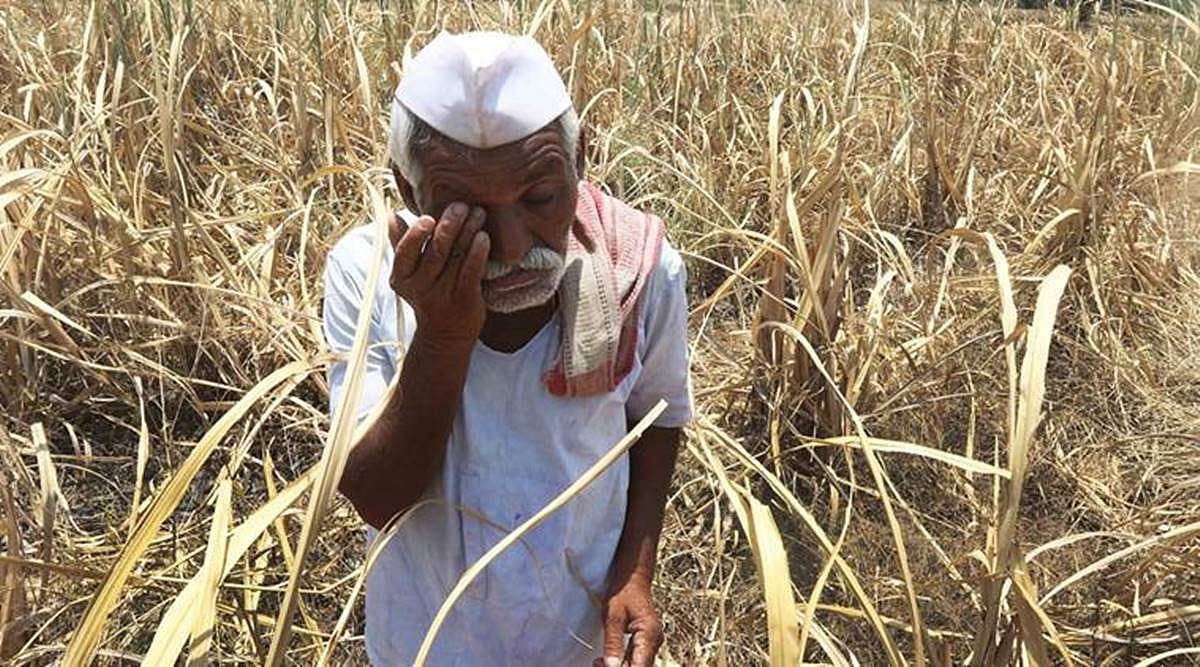Climate change has affected rain patterns all over the world, and India is no exception. Not only have the patterns changed, rainfall has also become erratic and unpredictable. A mere shift in the rainfall pattern would not have affected farmers as much as they have been affected by the erratic rainfall. Over the last few years, rain has taken a break for a long period after the start of monsoon. This dry spell badly affects a large number of farmers, as they have to do the sowing twice (dobar), as the seedlings get burnt in the absence of rain and due to the heat of the sun. This results in the loss of labour cost, seeds and fertilisers, in addition to the cost of clearing the soil and buying and sowing seeds the second time.
The bigger loss to the farmers is when there is excessive rainfall and worse still is a downpour after the crop is ready for harvesting. Rain at this stage destroys the crop, washing away the entire cost incurred till that stage. Farmers thus lose their investment in crop cultivation as well as the estimated annual or semi-annual income, depending on whether they go for rabi or kharif, or both crops. This has happened several times over the years, in Maharashtra and other states.
This year too, several states have experienced heavy rain in September and October, when it is time for harvesting. In Maharashtra it has primarily badly damaged cotton, soyabean, bajra, grapes and vegetables. Among the worst affected districts are Aurangabad, Beed, Latur, Jalna, Parbhani, Osmanabad, Hingoli, Gondia and Kolhapur.
According to reports, over 41 lakh farmers have filed claims for compensation from the government under the Pradhan Mantri Fasal Bima Yojana (PMFBY), a crop insurance scheme, introduced by the Union Government. But the process of settlement of the claims is very slow and only 4,974 farmers have received a consolidated compensation of Rs 2.63 crore. This needs to be seen in the backdrop of the number of farmers joining PMBFY. Over 91 lakh farmers of Maharashtra have joined the insurance scheme and have paid a consolidated premium of Rs 656.02 crore.
The problems of the farmers do not seem to affect leaders of political parties, and just about all parties are in focus here. The woes of the farmers are merely a political tool for politicians, which they use when in the Opposition; when it comes their turn to be in power, their concern seems to vanish.
In October 2020, there was a similar situation in Maharashtra, with thousands of hectares of agricultural land affected by rain and millions of tonnes of crop destroyed. At that time Bharatiya Janata Party Member of Parliament Sambhaji Raje toured the state to get first-hand knowledge of the extent of damage to the crop due to the heavy rainfall in Maharashtra. After the tour, he told mediapersons that he had visited the rain-affected fields to see the damage. He demanded that adequate compensation be paid to the farmers who had lost their crops.
A few days prior to that, Bharatiya Janata Party (BJP) leader Devendra Fadnavis, who was then the Leader of the Opposition in the state Legislative Assembly, with Uddhav Thackeray as Chief Minister, had demanded that the state Government should declare that Maharashtra was facing a wet drought.
The following year, on September 29, another BJP leader, then Leader of the Opposition in the Legislative Council Pravin Darekar, demanded that a wet drought should be declared in the state, especially in Marathwada, given the heavy loss of crop due to the heavy rains. He demanded that compensation be paid to the farmers immediately, without waiting for an evaluation (panchanama) of the extent of damage, as that would take at least a week and it would be unfair to make the farmers wait that long.
The situation has since changed; the BJP is in the Government and it is the turn of the Shiv Sena (Uddhav Group), Congress and Nationalist Congress Party (NCP) to make a demand for the declaration of wet drought in the state, with the BJP choosing to remain silent on the issue.
The extent of damage this year is yet to be known, but according to some estimates in Aurangabad division, 36,52,872 hectares of agricultural land and the standing crop on it has been damaged, resulting in the loss of crores of rupees to the farmers.
The government however has refused to declare that the state or parts of it are facing a wet drought, with State Agriculture Minister Abdul Sattar saying as much.
There is hardly any leader in the state who does not like to exhibit concern for the farmers; Mr Sattar and Chief Minister Eknath Shinde are no exception to this. Mr Sattar expressed his love for farmers by having a meal at a poor farmer’s place and Mr Shinde gave gifts to a few farmers on the occasion of Diwali. But as a community, it is proper compensation that the farmers want, and that must be done at the earliest, lest we see more suicides in coming days.
As for awareness, the urban population is not terribly bothered about the problems of the farmers, and many are not even aware of the tremendous efforts that farmers put in in the fields and the huge financial risks involved in agriculture. A campaign was run on social media on October 27 with the hashtag #wetdrought, demanding the declaration of a wet drought and compensation to the farmers. The idea was to make the hashtag trend, but it did not elicit the expected response. Apparently the only time urbanites remember farmers is when the prices of agricultural products go up!
The author is a senior journalist and media trainer. He tweets at @a_mokashi









